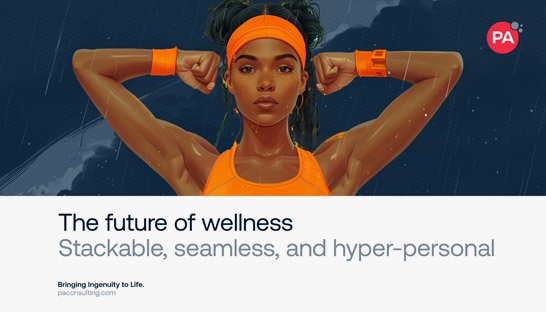New findings from PA Consulting suggest that nearly four in five consumers have purchased sports and health-related products in the past two years, and the same number are expected to increase their spending in the next two years, although growth has slowed in the UK, possibly because the country still has a socialised healthcare system.
Across the world, the global health and fitness industry is expanding rapidly. Consumers want to continue their lockdown exercise habits even after the lockdown period is over. Health and wellness at home has become high on the agenda during the pandemic, with 30% of consumers intending to continue exercising regularly at home even after lockdown measures are eased.
Other contributing factors include the lack of support offered to individuals by increasingly privatised healthcare systems around the world. With the implicit understanding that most governments simply advise people not to get sick, or it will cost them money, consumers do what they can to improve their chances of avoiding illness.
Source: PA Consulting Sports Wellness Survey
In this context, it may not be all that surprising that the United States appears to lead the global health and wellness market. A new survey of 4,000 consumers on both sides of the Atlantic by PA Consulting found that 78% of respondents had purchased sports and wellness equipment, products or technology in the past two years.
The company also found that a notable number of people expect to maintain their spending over the next two years: 78% said they plan to spend the same or more on fitness in the next 12 months, and 78% said they are interested in purchasing new health or wellness products or services in the next two years.
You might think that people who are already buying health and wellness products will continue to do so, but PA predicts this will manifest as a booming wellness market, which will grow by nearly $3 trillion and be worth $8.5 trillion by the end of 2027.
“The global wellness economy is booming across all sectors as people prioritize healthier choices and consumer spending trends upward,” said David Knies, wellness and innovation expert at PA Consulting. “Brands that can offer more personalized solutions while addressing consumer concerns around trust, inclusivity and affordability will be best positioned to reap long-term benefits.”
Source: PA Consulting Sports Wellness Survey
But there may be more factors at play than just people wanting to make “healthier choices.” If this growth materializes, it will be disproportionately fueled by US consumers, who find health advice expensive to access and, when they do, are generally more profit-driven. 81% of consumers said they had purchased a health device in the past two years, compared with 76% in the UK. US consumers are also more likely to keep spending: 80% compared to 75% in the UK.
The discrepancy may be due to the nature of the health care systems in both countries. Although the UK NHS is said to be in historic crisis with huge waiting lists and staffing shortages due to a decade of austerity, dietary advice is still easily available for free and expert advice is not fully marketed. As such, only 64% of UK respondents said they received personalized vitamins or supplements (which are unproven for people who already eat healthy), whereas in the US this figure rose to 70%. Meanwhile, the number of UK respondents who trust private health care technologies is lower than in the US, at 48% and 54%, respectively.
PA also features AI art in the report, including a young woman who appears to be showered in Gatorade, a woman using a phone with six-fingered hands, and a weightlifter with an impressively long neck, and offers advice for health care providers to boost trust in their tech solutions. This includes convincing consumers of the “benefits of sharing biomedical data to achieve health goals.” But it could take a long time for UK consumers to be convinced, as they can, at least for now, rely on publicly funded advice about their health conditions.

